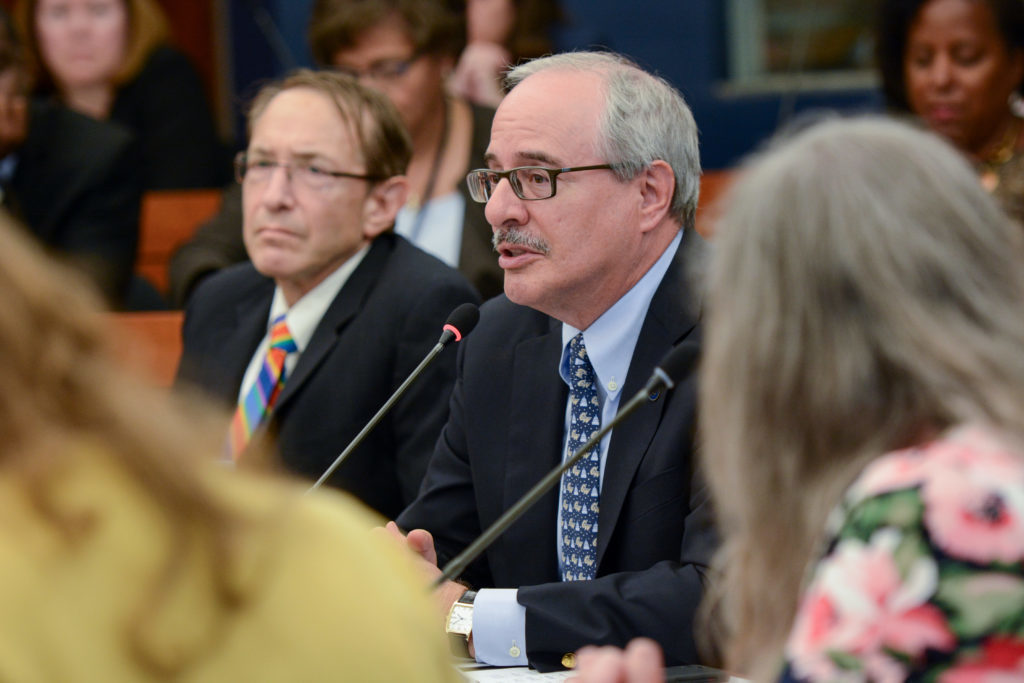When University President Thomas LeBlanc arrived on campus in August, the first question he asked his top research official was not about federal grant dollars or scientific labs, but about how many books English faculty have published in the last five years.
LeBlanc said at his first Faculty Senate meeting last month that he knew Leo Chalupa, the vice president for research, would be able to recount the usual metrics of success in a research profile – like grant money – but he wanted to know “about all the other scholarship we’re doing here at the University.”
After years of intense focus by the University on building scientific and engineering research, LeBlanc said at the Faculty Senate meeting that he would examine the University’s entire research enterprise, an area the new president estimated GW spent between $200 and $250 million on in the last fiscal year. As LeBlanc conducts the research review this academic year, faculty said officials need to boost hiring to give professors more time to focus on projects and examine new sources of research funding as federal spending slows.
“If universities don’t aspire they should close up shop,” he said at the meeting. “Today if we’re thinking about a university of this stature that isn’t either seeking or achieving preeminence with science and engineering, it would just be wrong.”
“We are ready to take up President LeBlanc’s call to action and engage the research community to meet these goals.”
Chalupa said he is “energized” by LeBlanc’s commitment to expanding the University’s research mission. He said he will work with officials and individual schools to support researchers and streamline operations.
“We are ready to take up President LeBlanc’s call to action and engage the research community to meet these goals,” he said in an email.
Chalupa declined to say what he thought should be examined as part of the research review or how funding priorities might shift as a result of the assessment.
Since officials named Chalupa the University’s first vice president of research in 2008, the University has moved up roughly 30 spots in the National Institute of Health’s rankings for federal research funding.
Katrin Schultheiss, the chair of the history department, said in order for research productivity to increase, faculty will need more time to work on those projects, but she said officials are often hiring adjunct or contract professors who primarily teach courses.
“There’s no way they can fit research into a schedule like that,” Schultheiss said.
Last year the research office added a $1,000 incentive for faculty in the humanities to ask for outside grants to encourage those professors to seek out federal research dollars.
Schultheiss said “deprioritizing” hiring tenure-track faculty will most likely lead to an influx of adjunct faculty, who – based on their part-time status and teaching requirements – would not have the time to conduct research.
Tyler Anbinder, a professor of history, said the review should seek to address the difficulties professors have encountered getting the office to approve employees to help on projects and in labs.
Last year, faculty said they had problems hiring graduate students for their research because of the high turnover in the office, including the departure of a top research official. An automated system was introduced last year to streamline the process to hire more students.
Keith Crandall, a professor of bioinformatics and director of the Computational Biology Institute, said GW’s courses should devote more attention to building research skills to help students land jobs after graduation and encourage more to be involved in projects.
“If you don’t have an active research program, you’re not going to be teaching the students the things they need to know to be competitive in the job market today.”
“If you don’t have an active research program, you’re not going to be teaching the students the things they need to know to be competitive in the job market today,” he said.
He said government funding is increasingly rare, especially under the Trump administration, which has proposed slashing funding to key research agencies like the National Institutes of Health. Officials should explore different avenues of funding – like corporate and philanthropic sponsorships – to make the difference, he said.
Last month, officials announced an engineering professor would receive $5.3 million from a Maryland-based patent company to study an emerging cancer treatment – the largest corporate research agreement in University history.
Crandall said the University could also better advertise undergraduate research projects, encouraging faculty and students present their work to donors to attract more funding for major projects.
Sylvia-Marotta Walters, the chair of the Faculty Senate’s executive committee, said she approved of the direction LeBlanc wanted to take in evaluating research on quality, not just the amount of research dollars faculty can bring in from external grants.
In the last year, outside funding for STEM-related research has brought in millions of dollars in grants to the University, including a $1.8 million grant for anal cancer research and $2 million for HIV research from the NIH.
“He’s made that very clear that it isn’t only about the funded dollars, it’s also about the quality of the scholarship that comes out of the philosophy department for instance,” she said. “So I’m very happy to see that research in all of the departments are important to him.”





